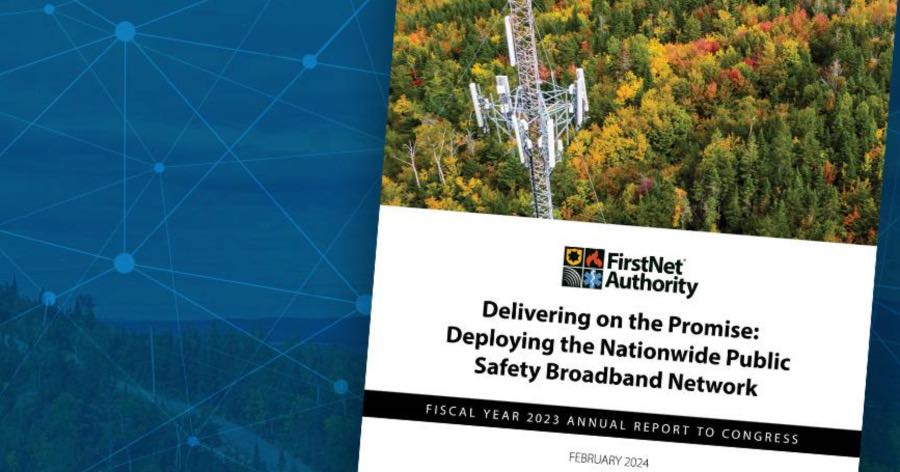
This year’s Annual Report to Congress highlights the benchmark achievements and continued progress that the First Responder Network Authority (FirstNet Authority) has made throughout fiscal year (FY) 2023. The report, “Delivering on the Promise: Deploying the Nationwide Public Safety Broadband Network,” details the FirstNet Authority’s milestone successes in ensuring the deployment of the FirstNet network and securing the renewal of its Band 14 license by the Federal Communications Commission (FCC); it also demonstrates the FirstNet Authority’s continued commitment to innovation and serving our nation’s public safety community.
In FY 2023, the initial network buildout of the Nationwide Public Safety Broadband Network (NPSBN) was completed on time, on budget, and on target. The network was built out in all 50 states, 5 territories, the District of Columbia, and on tribal lands, in accordance with contractual requirements and state plans that were coordinated with public safety and approved by governors in 2017. Validation of the network buildout occurred in early FY 2024.
Working through our public-private partnership with AT&T, the FirstNet Authority has delivered an operational network that provides life-saving communications technology to first responders across the country, from urban centers to the most rural pockets of the nation.
In FY 2023, the FCC renewed the FirstNet Authority’s Band 14 spectrum license, the dedicated spectrum allocated to the FirstNet Authority by Congress for the NPSBN. The FCC Order included findings that the FirstNet Authority met all statutory requirements, including those related to governance, state and local consultation, network deployment, network safety, security, resiliency, interoperability, rural coverage, and promoting integration of the FirstNet network with emergency communications centers. The FCC’s findings validated that the FirstNet Authority’s stewardship over the first decade of the FirstNet program was consistent with congressional intent.
However, the spectrum license is only one of two pillars required to ensure the continued operation of the FirstNet Authority. Without congressional reauthorization, the FirstNet program will sunset in February 2027. If Congress does not take action to reauthorize the Authority before the sunset date, the program will not be able to provide the dedicated network services that millions of first responders have come to rely on each day. Early reauthorization by Congress will provide FirstNet subscribers in the public safety community across the United States with the assurance that FirstNet services will be there for them in the years to come.
The FirstNet Authority continued to advance public safety communications in FY 2023, achieving the following operational successes:
Adoption: There has been significant, continuing adoption of FirstNet by public safety. In FY 2023, there were approximately 26,000 public safety agencies and organizations subscribed with 5 million device connections to the network.
Investment: The FirstNet Authority continued to enable 5G network capabilities through initial upgrades to the FirstNet network Core, expanding the fleet of FirstNet deployables, and enhancing in-building coverage capabilities to provide enhanced coverage where public safety agencies operate indoors, such as police headquarters, fire stations, emergency communications centers, and other critical sites.
Applications and Devices: As required by Congress, the FirstNet network uses technology based on commercially available, open standards to achieve interoperability, speed to market, economies of scale, and cost efficiency. In FY 2023, there were more than 215 unique apps vetted for security and available in the FirstNet app catalog and over 820 FirstNet Ready™ devices, which undergo a rigorous certification process in our Boulder Lab facility.
Deployables: In FY 2023, FirstNet had a fleet of over 180 deployables — from Satellite Cell on Light Trucks (SatCOLTs), vehicles with mobile cell sites, to compact rapid deployables (CRDs), which are small, highly portable cell sites that can be owned and controlled directly by public safety agencies.
The public safety community continued to demonstrate innovative ways to use FirstNet service to support everyday operations and major emergencies. For example, in FY 2023, Tennessee became the first state in the nation to initiate a full wireless backup of its 118 primary public safety answering points (PSAPs)/emergency communications centers with FirstNet. Wireless backup means that even during the toughest strains and worst-case scenarios, network connectivity will be available for 9-1-1 service calls in Tennessee. With the FirstNet deployment, when disruption to the primary 9-1-1 center connection is detected, the calls are automatically re-routed over the FirstNet network to ensure they are answered. The annual report highlights several other examples of public safety’s use of FirstNet in FY 2023.
More than 400 public safety, federal government, industry, and academia stakeholders came together to exchange ideas and discuss the future of public safety communications at “5x5: The Public Safety Innovation Summit” in San Diego, California. The event was held in June 2023 and co-hosted by the FirstNet Authority andthe National Institute of Standards and Technology Public Safety Communications Research Division.
During the summit, stakeholders shared key insights and feedback with the FirstNet Authority to support investment and research activities. This year’s 5x5 Summit will be held in Chicago, Illinois, from June 25-27.
Over the course of the year, the FirstNet network supported public safety response across the country, in matters large and small, demonstrating its flexibility, resilience, and relevance. The network continued to evolve, reflecting the indispensable role of communication and collaboration between the FirstNet Authority, AT&T, and the stakeholders in the public safety community, to create an enduring and dynamic partnership that catalyzes results.
Today, the FirstNet Authority is at the cusp of a new chapter, yet its overarching goal remains unchanged — to meet the evolving communications needs of our nation’s first responders. We know that first responders give us their all every day, and they deserve nothing less in return.